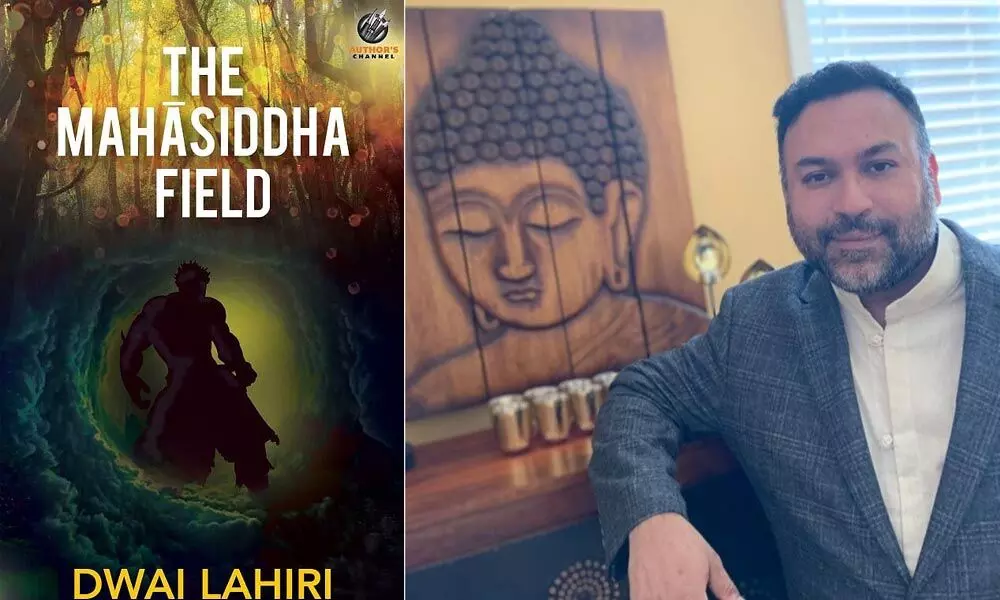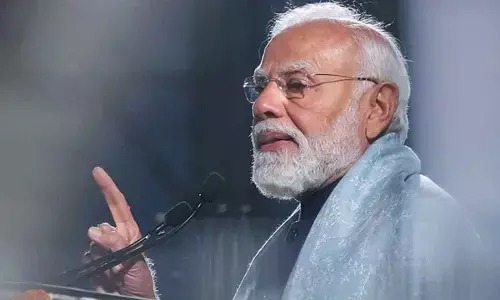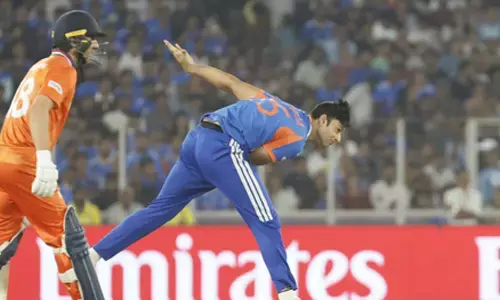Mythology collides with suspense and action

Mythology collides with suspense and action
The teachers of the Dévas (gods) and the Asuras were human sages, known as Rishis
The teachers of the Dévas (gods) and the Asuras were human sages, known as Rishis. The book 'Mahasiddha Field' is about what happens when seemingly unconnected individuals get drawn into a world of suspense and action, as mythology collides with their world. The book, 'The Mahāsiddha Field' is the first in a new sci-fi/fantasy series by author Dwai Lahiri.
Extracts from an interview
Who is Dwai Lahiri, apart from being an author that is?
I'm quite a boring individual -- I have a few activities that I follow without fail. For example, I've been a practitioner of taijiquan (or Tai Chi) for almost two decades now -- I must have missed only a few days of practice in the entire period. So my time is usually spent with my family and practicing tai chi and meditation outside of my normal work schedule.
When time permits and the spirit moves me, I also play music - the guitar is my primary instrument. I won't say I'm very good at it, but I'm not very bad at it either.
Tell us about your journey with The Mahasiddha Field… From conceptualizing to getting it published.
The book started as a series of short stories I originally intended to publish on The Medhajournal -- an online journal I started to provide an avenue for people with love for, and knowledge of the wisdom traditions of the world.
After a while it didn't remain short anymore, and so it became a novel.
As I've mentioned in the preface of the book, it took me approximately nine years to complete the story. But I am glad it took as long as it did - because I matured a lot spiritually as well as in life over those years.
In my life I've seen that opportunities and avenues open up if we stop trying to force the outcome and just work on what is in our control. My primary objective was to finish the story, which I did in the summer of 2019 and then I asked a few close friends to read it and provide me some feedback. I got some really positive reviews from them, and that encouraged me to find out more about actually publishing the book.
At that time, one of my friends introduced me to Aruna Naidu from Author's Channel. Things seemed to naturally fall into place one after another at that point, and Aruna helped me through the process of publishing -- editorial, cover design, print formatting, and so on. I am so glad to get that guidance and help.
The entire process has been a surreal experience and I'm coming to terms with it on a day to day basis.
Let's talk about Wuxia, one of the elements utilized in the book.
Wuxia is a chinese term for novels with the main characters being Martial heroes, who are capable of superhuman feats, empowered by their martial arts (both exoteric as well as esoteric). While the 'martial hero' part is certainly unique to the chinese traditional literature, in our indic traditions too we have similar stories -- the Betala Pachisi, popularly known as the stories of Vikram and Betal, being one of my favorites.
The unique element of this form of storytelling is to be able to convey a deeper spiritual message while remaining entertaining in the most fantastical manner possible. There isn't always necessarily one main character, namely 'The Hero', but usually a team of main characters. The primary protagonist doesn't necessary have to follow an arc known as 'The Hero's Journey' - the main character might be a master in every possible way imaginable, whose purpose in the story/adventure is to fulfil a greater role - bring about spiritual or some other positive life-altering change in the lives of all other characters they touch.
The main difference between the most popular mode of story-telling in the West (which has become the de facto across the world because Western culture is the popular culture today) and the Eastern model is precisely that -- the traditional eastern model doesn't necessarily need a Hero's journey or a Hero's struggle, though there might be such elements embedded within the story. The greater purpose of the story would be to build an atmosphere and create scenarios where the reader undergoes a transformation in the process, where they learn something new and/or realize that the story is a pointer to a deeper truth that they've not paid attention to in their 'normal' life.
While in the West, fantasy is a genre that was created to fill a void left by the lack of native mythology (maybe in the Western context, the mythology part was discarded as superstition during the 'enlightenment' period), in the East, in my humble opinion, we never had the need for such a genre. Mythology, perhaps better addressed as Puranas and Itihaasa in the Indic tradition has always been a part of our popular culture - which addresses the need for fantasy and much much more. My exposure to other Eastern cultures leads me to believe that, that is also the case with them.
We in India didn't need Superman or Wonderwoman because our epics were about far more 'real' supermen and wonder-women. I often tease Indian american kids about who is better -- Superman or Hanuman -- I think Hanuman is way cooler.
What is the one message that you want your readers to take away from this book.
I would say, if the readers are able to connect with the spiritual message underlying the book, I will consider it a successful endeavor. There are motifs in the book that might seem 'fantastical' or 'simplistic' depending on the perspective of the reader -- but they are rooted in deep spiritual insights of the great non-dual traditions of the East - Vedanta, Tantra, Daoism, Buddhism.
That All existence is but One Awareness - is that a simplistic belief of a naive and idealistic mind or is that the most powerful and sophisticated perspective in alignment with modern scientific research today?
Our world is progressively becoming a materialistic one, and the progression is ever-accelerating. Yet, our understanding of our own nature has not really grown much - if anything, we seem to have devolved as a collective when it comes to self-knowledge. If this book can raise the curiosity of some of the readers into the aspect of Self-inquiry and Self-realization, I couldn't ask for anything more.
What is the USP of this book that makes it stand apart from the others in the genre?
I wrote a book that I personally would enjoy reading - I think the story is really a genre-mashup -- it's not just science-fiction, not just fantasy, not just metaphysics, not just mythology. If people keep an open mind and read for the love of reading, they might find it different from anything else they've read before in popular fiction.
What can we expect from you next?
I'm working on the next book in the series -- The Mahasiddha Reclamation. I hope to have it ready towards the end of 2020.








